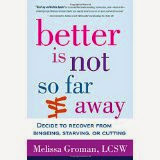
"If I'm feeling hysterical, its usually historical." ~ anonymous
Someone once told me that nothing good happens after 10:00 at night. Of course I know that this is not a universal truth, but for anyone who is prone to worry or panic, or sleep disturbance, late night can bring anxiety to new heights.
At night, paranoid thoughts can increase, self attack intensifies, and what may have seemed like forgivable mistakes can become relentless self doubt. A friend of mine, who has some humor about her night panic, tells me that some nights she is convinced that there are goblins in her hallway, monsters under her bed and aliens on her roof. Her boss is waiting to fire her; her doctor is waiting to give her dire news and her husband has three secret other wives.
She knows its her brain on rev, but still and all she worries. And the worry is real, and it is painful. She worries about her kids, her marriage and her financial situation. Some nights the worry turns into obsession and the obsession turns into sleeplessness, and the sleeplessness turns into more self attack.
Physical and mental exhaustion, hormones, biorhythms, brain chemistry can all contribute. So can an unresolved bad feeling in a relationship. So can the darkness itself. And one's personal history, even if the connection is not readily apparent. Somehow, late at night the mind can start conjuring up a parade of bad thoughts. An attack of "what ifs" or a barrage of "awfulizing" can take over rational thought. When the anxiety gets really bad, it can leave you longing for relief, but believing that none is really possible. If only there were an ice pack for the brain.
So what helps?
Well, I think that sufferers of night panic have a few choices, and any one or a combo can bring relief at one time or another. And first things first is being willing to believe that relief is both okay and possible. If you are stuck in the thought, however subtle, that the worry is actually keeping you safe from anything bad actually happening, you may need to address this belief first. Planning, consulting and considering can bring good results but when we are stuck in panic, obsession and rumination the pain can be intense and can block the way to solving real issues or getting relief from relentless worry.
Here are a few ideas, in no particular order, that can help with night panic:
~Listen for the thoughts under the panic. Write them down in a stream of consciousness, no holding back fashion. Look over them the next day and see which thoughts are fueling the feelings. Come up with a few good reassuring answers to the panic thoughts (even if you don't believe them 100%.)
~Come up with a few reassuring mantras to say to yourself such as "this too shall pass," "the worry is always worse than the actual event," or "even if something bad happens I can find support and get help."
~Talk back to the panic. Tell it to leave you alone, get lost, that feelings are not always facts and you will not let its panic messages ruin your night.
~Go to bed earlier. I don't mean to sound glib, but for night worriers, turning in earlier can help.
Someone once told me that nothing good happens after 10:00 at night. Of course I know that this is not a universal truth, but for anyone who is prone to worry or panic, or sleep disturbance, late night can bring anxiety to new heights.
At night, paranoid thoughts can increase, self attack intensifies, and what may have seemed like forgivable mistakes can become relentless self doubt. A friend of mine, who has some humor about her night panic, tells me that some nights she is convinced that there are goblins in her hallway, monsters under her bed and aliens on her roof. Her boss is waiting to fire her; her doctor is waiting to give her dire news and her husband has three secret other wives.
She knows its her brain on rev, but still and all she worries. And the worry is real, and it is painful. She worries about her kids, her marriage and her financial situation. Some nights the worry turns into obsession and the obsession turns into sleeplessness, and the sleeplessness turns into more self attack.
Physical and mental exhaustion, hormones, biorhythms, brain chemistry can all contribute. So can an unresolved bad feeling in a relationship. So can the darkness itself. And one's personal history, even if the connection is not readily apparent. Somehow, late at night the mind can start conjuring up a parade of bad thoughts. An attack of "what ifs" or a barrage of "awfulizing" can take over rational thought. When the anxiety gets really bad, it can leave you longing for relief, but believing that none is really possible. If only there were an ice pack for the brain.
So what helps?
Well, I think that sufferers of night panic have a few choices, and any one or a combo can bring relief at one time or another. And first things first is being willing to believe that relief is both okay and possible. If you are stuck in the thought, however subtle, that the worry is actually keeping you safe from anything bad actually happening, you may need to address this belief first. Planning, consulting and considering can bring good results but when we are stuck in panic, obsession and rumination the pain can be intense and can block the way to solving real issues or getting relief from relentless worry.
Here are a few ideas, in no particular order, that can help with night panic:
~Listen for the thoughts under the panic. Write them down in a stream of consciousness, no holding back fashion. Look over them the next day and see which thoughts are fueling the feelings. Come up with a few good reassuring answers to the panic thoughts (even if you don't believe them 100%.)
~Come up with a few reassuring mantras to say to yourself such as "this too shall pass," "the worry is always worse than the actual event," or "even if something bad happens I can find support and get help."
~Talk back to the panic. Tell it to leave you alone, get lost, that feelings are not always facts and you will not let its panic messages ruin your night.
~Go to bed earlier. I don't mean to sound glib, but for night worriers, turning in earlier can help.
~Distract your mind. Read. Watch TV. Listen to music.
~Take a personal history. Think back to what bed time was like when you were a child. What are your memories? What were your parents doing late at night? Where were they? Did they tend toward calm or toward anxious? What feelings come up? Consider connecting the dots between your experiences now and the experiences that may have shaped you as a child.
~Make a list of everything and anything that is on your mind from things to do - to things that are worrying you. Leave nothing out. Then put the list away to review during the day.
~Make a gratitude list, a victory list, a list of things that are good and right with you, and in your world.
~Follow the feeling and see where it takes you. Don't fight it, study it. Get curious and wonder if it is new or old, familiar or strange. What or who does it remind you of? Might it have a benefit, a message, or a purpose?
~Talk, talk and talk some more. Talk about the things that may be making you feel angry, frustrated or helpless.
In the back and forth between accepting and feeling your feelings and actively using cognitive or behavioral techniques to help bring on relief, consider that there may be many good roads to relief. Often times there is meaning in our experiences, and when we are willing to tap into what that meaning is, we can end up with a richer life experience and better nights.
~Talk, talk and talk some more. Talk about the things that may be making you feel angry, frustrated or helpless.
In the back and forth between accepting and feeling your feelings and actively using cognitive or behavioral techniques to help bring on relief, consider that there may be many good roads to relief. Often times there is meaning in our experiences, and when we are willing to tap into what that meaning is, we can end up with a richer life experience and better nights.











